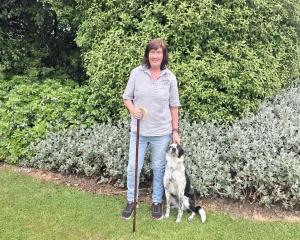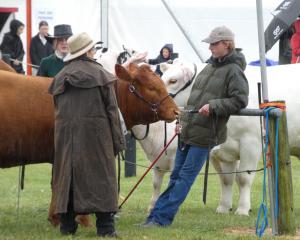
The owner of the Narrogin-based Kaya Dorper stud has 3000 stud Dorpers and a partnership in Sweden. He was brought over to judge the Dorper and White Dorper sheep at the three-day Canterbury A&P Show in Christchurch as part of the breed’s 25th anniversary of arriving in New Zealand.
Mr Veitch ran a close eye over 70 to 80 self-shedding Dorpers and White Dorpers at the event which had extra status this year as a Royal Show.
"Probably there’s a few White [Dorper] rams here that would be nice [to take home]. There’s probably four or five really nice rams which have very good feet, good muscling through the shoulder and forequarter and good bone. I could use them. There’s a couple of Dorper ewes that are very nice, just neat sheep. If I put them in my flock ... they would just fit in nicely. I always say to people you are better off buying a really average ram out of a very good stud than a really good ram out of a very average stud."
He said farmers concentrated on rams, but a good line of ewes was probably "90% of the game".
The veterinarian began his stud in 1996, after completing all the vet work when the Dorpers were brought into Australia.
"I was a wool person back then and a chap owed me some money so gave me six Dorper ewes and that’s where I got going. My old man was a shearer and I used to shear a bit when I was a young fella so Dorpers were a big change."
A few years later he played a large hand in bringing them to New Zealand.
"I sent the first lot here to Bill Lott who was down in Garston back in 2001 near Queenstown. He asked me for one ram and I told him he was wasting my time so I decided to send four and we ended up sending about 100 animals on the plane. We sent them across and Bill and Maureen Lott had a sale and sold them all ... we did that twice and that’s how we came across with the whites and the Dorpers."

He said the sheep were more compact than in Australia as a result of probably having to walk further, and nutrition.
"The sheep are a desert animal really and Dorpers especially were bred in dry conditions so the wet conditions don’t always suit them. Normally at home through the summer we have to feed our sheep. My older Dorper sheep I don’t have to feed and I only feed the young ones and they stay massively fat and they’re running on pretty much nothing ... A lot of it is they are not growing wool so that’s a difference. The ones with thick skin have fat in the skin so when things are tough they will use that like a camel reserve."
His Dorpers in Sweden were lambed every six months and generally weaned at three months to keep ewes in good condition. Mr Veitch was unaware if this was being carried out in NZ, but in Australia an eight-month cycle was routinely followed.
Mr Veitch travels widely and only lambs once a year with the Dorpers lambing at 140% to 150% and the White Dorpers at 100% to 110% at an annual rainfall of 500mm, including no rain from October to May.
His stud of 3000 purebred ewes are DNA tested and he is a big fan of recording data to gauge breeding improvements.
Mr Veitch no longer works as a vet, but specialised in embryo work and artificial insemination for more than 35 years.
In the early days he did a lot of work in NZ, taking and refining all the research and placing it in commercial farming.
At the show Dorset Downs breeders celebrated the breed’s 75-year anniversary in New Zealand.














